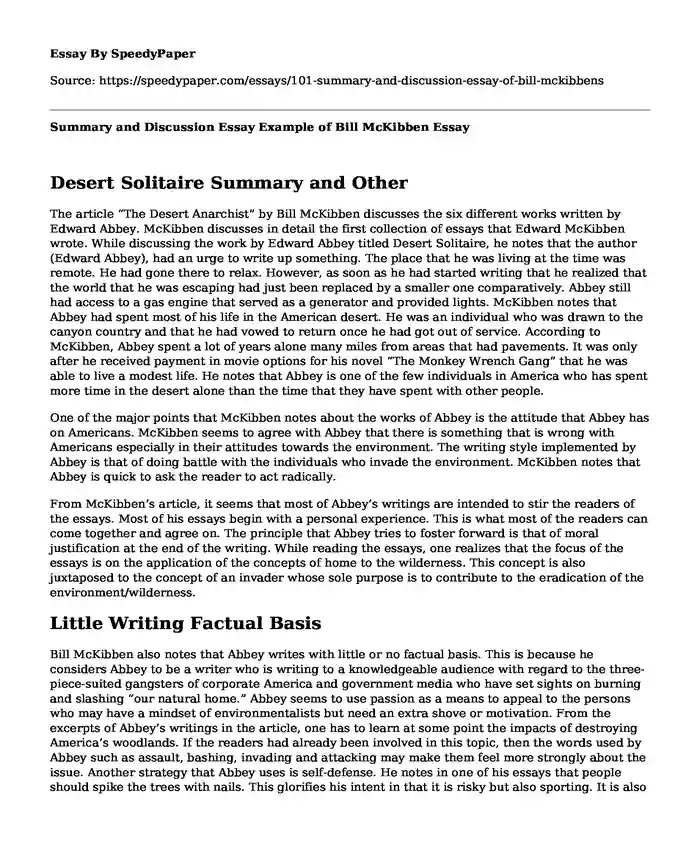
| Type of paper: | Essay |
| Categories: | Creative writing Literature Resume |
| Pages: | 4 |
| Wordcount: | 867 words |
Desert Solitaire Summary and Other
The article “The Desert Anarchist” by Bill McKibben discusses the six different works written by Edward Abbey. McKibben discusses in detail the first collection of essays that Edward McKibben wrote. While discussing the work by Edward Abbey titled Desert Solitaire, he notes that the author (Edward Abbey), had an urge to write up something. The place that he was living at the time was remote. He had gone there to relax. However, as soon as he had started writing that he realized that the world that he was escaping had just been replaced by a smaller one comparatively. Abbey still had access to a gas engine that served as a generator and provided lights. McKibben notes that Abbey had spent most of his life in the American desert. He was an individual who was drawn to the canyon country and that he had vowed to return once he had got out of service. According to McKibben, Abbey spent a lot of years alone many miles from areas that had pavements. It was only after he received payment in movie options for his novel “The Monkey Wrench Gang” that he was able to live a modest life. He notes that Abbey is one of the few individuals in America who has spent more time in the desert alone than the time that they have spent with other people.
One of the major points that McKibben notes about the works of Abbey is the attitude that Abbey has on Americans. McKibben seems to agree with Abbey that there is something that is wrong with Americans especially in their attitudes towards the environment. The writing style implemented by Abbey is that of doing battle with the individuals who invade the environment. McKibben notes that Abbey is quick to ask the reader to act radically.
From McKibben’s article, it seems that most of Abbey’s writings are intended to stir the readers of the essays. Most of his essays begin with a personal experience. This is what most of the readers can come together and agree on. The principle that Abbey tries to foster forward is that of moral justification at the end of the writing. While reading the essays, one realizes that the focus of the essays is on the application of the concepts of home to the wilderness. This concept is also juxtaposed to the concept of an invader whose sole purpose is to contribute to the eradication of the environment/wilderness.
Little Writing Factual Basis
Bill McKibben also notes that Abbey writes with little or no factual basis. This is because he considers Abbey to be a writer who is writing to a knowledgeable audience with regard to the three-piece-suited gangsters of corporate America and government media who have set sights on burning and slashing “our natural home.” Abbey seems to use passion as a means to appeal to the persons who may have a mindset of environmentalists but need an extra shove or motivation. From the excerpts of Abbey’s writings in the article, one has to learn at some point the impacts of destroying America’s woodlands. If the readers had already been involved in this topic, then the words used by Abbey such as assault, bashing, invading and attacking may make them feel more strongly about the issue. Another strategy that Abbey uses is self-defense. He notes in one of his essays that people should spike the trees with nails. This glorifies his intent in that it is risky but also sporting. It is also fun and illegal at the same time but ethically imperative. The message that he wants to pass across is that loggers hate nails as it harms their machines and may also kill them. Abbey seems successful in manipulating readers who may not be careful in looking at the issue from one angle. On the other hand, McKibben has written the article more like a conclusion based on the certain premises. Most of his arguments are backed by strong scientific facts, and most of the themes are geared towards the environmental concerns that we may have both externally and internally. From Mckibben’s writings, it is imperative to comprehend that the writings are straightforward and the facts that he provides increases the integrity of the essay. Abbey, on the other hand, is an anarchist who wants to light up fires no matter the consequences. Abbey does not approve of the journalistic ways of writing.
One may note that the writing styles of both Abbey and McKibben are very different. Abbey seems to care at all so long as his message gets to the intended receiver. Abbey gives the individuals who are already involved in the issue more passion, and this increases the number of people who believe in its hot-blooded brand of environmentalism. On the other hand, Mckibben attempts to write with a good conscience in the bid to cage the minds of persons rather than manipulating them as Abbey does. Regardless of the writing style that both authors have, they seem to be successful for the purposes that they are writing for.
Cite this page
Summary and Discussion Essay Example of Bill McKibben. (2018, Sep 18). Retrieved from https://speedypaper.net/essays/101-summary-and-discussion-essay-of-bill-mckibbens
Request Removal
If you are the original author of this essay and no longer wish to have it published on the SpeedyPaper website, please click below to request its removal:
- Essay Example: Education Is a Need for Every Human Being
- V for Vendetta - Movie Review Essay Example
- Free Essay with Annotated Bibliography on Software Development Example
- Check Out Criminal Justice Research in Our Free Essay
- Free Essay Example on Public Service
- Abuse of Emergency Powers - Free Essay in Political Science
- Essay Example: The Positive Impact of Electronic Sports on College Students
Popular categories




